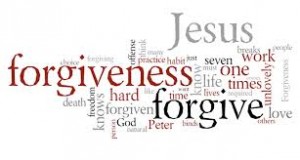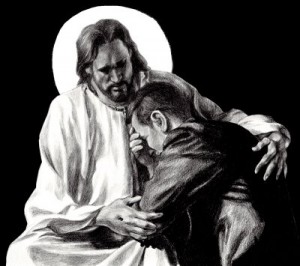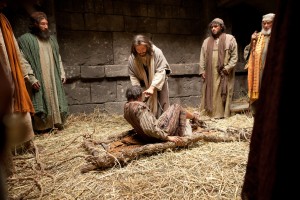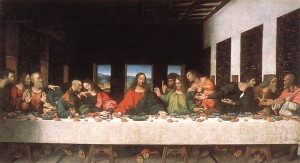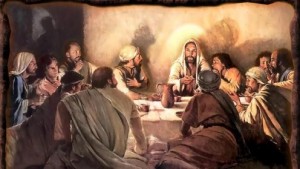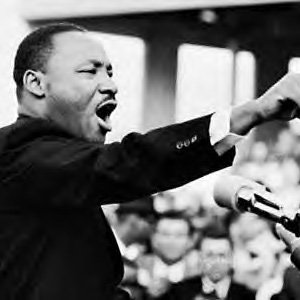Matthew 25: 15-20
Lent 5C March 13, 2016
 The apostle Paul was way ahead of his time when he described the Church as the Body of Christ. While it is a helpful metaphor to describe the Church of Jesus Christ as a living organism with Christ as the head and members with a variety of gifts and callings as the body parts, more and more we are realizing that it is true scientifically.
The apostle Paul was way ahead of his time when he described the Church as the Body of Christ. While it is a helpful metaphor to describe the Church of Jesus Christ as a living organism with Christ as the head and members with a variety of gifts and callings as the body parts, more and more we are realizing that it is true scientifically.
The body is a system made up of many sub-systems. We have a nervous system, a circulatory system, a respiratory system, a vascular system, a digestive system and so on that must work in harmony or congruence if the whole body is to function. The body is so interrelated that if one system malfunctions or under functions it impacts all of the other systems. Or sometimes some portion of your body aches that has nothing to do with the actual problem. My father, for instance, was a paraplegic and would often get headaches or fevers if he had an infection elsewhere because he couldn’t feel it, so his body sent a signal that something was wrong.
By observing the biological world, psychologists, neurologists, family therapists and organizational specialists have realized that the same principles of interaction for biological systems apply to human emotional systems. Families are an emotional system. Companies are an emotional system. The Rotary Club is an emotional system. And churches, especially churches, are an emotional system. All emotional systems want stability. There are appropriate structures and boundaries that keep the system in equilibrium. We have by-laws, committees, and unspoken folkways about how to serve communion, appropriate language and topics suitable from the pulpit, expectations of the minister and so on. When this “comfort zone” is pushed, then usually there is feedback. Rumors fly, gossip goes around, people meet in the parking lot. This is known as anxiety in a system.
As human beings we have two poles or two sets of needs. We are social animals and so we need to be close to others and in relationship. But we are also unique individuals and need our own personal space. When we become too close to someone we become enmeshed and our own uniqueness is absorbed by another. Alcoholic families are often enmeshed as everyone colludes to try to protect the alcoholic from the consequences of his or her behavior. On the other hand, we need our space to be differentiated individuals made in the image of God. If we move too far away from others we become isolated and cut-off all emotional contact. Oftentimes rigid families with strict role expectations have order in their households, but no warmth or human connection.
 Thus, we are always engaged in this dance of moving in and moving out, or getting close and getting separate. When the familiar boundaries are violated we get anxious and try to pull someone else into the constellation to ease the anxiety. This is called triangulation. So, for instance, when the pastor starts introducing contemporary worship into the Sunday morning service that isn’t familiar, some people may get uncomfortable. The system is changing. The pastor isn’t who we thought she was or she’s not playing by the rules. So instead of going to the pastor, I go to someone else and ask them what they thought to manage the discomfort. Then you may get several more allies. Then you may sign a petition or have an all-church meeting or send out an anonymous email blast. This is one way a system, be it a biological family or a church family, manages differences, changes, or foreign elements being introduced into the system.
Thus, we are always engaged in this dance of moving in and moving out, or getting close and getting separate. When the familiar boundaries are violated we get anxious and try to pull someone else into the constellation to ease the anxiety. This is called triangulation. So, for instance, when the pastor starts introducing contemporary worship into the Sunday morning service that isn’t familiar, some people may get uncomfortable. The system is changing. The pastor isn’t who we thought she was or she’s not playing by the rules. So instead of going to the pastor, I go to someone else and ask them what they thought to manage the discomfort. Then you may get several more allies. Then you may sign a petition or have an all-church meeting or send out an anonymous email blast. This is one way a system, be it a biological family or a church family, manages differences, changes, or foreign elements being introduced into the system.
This is not necessarily bad. A vaccine introduces a virus into our system and strength-ens our immune system as it mobilizes forces to resist and overcome future viruses. Often, when people act out, it’s not because they’re bad people, but they may be putting the brakes on because something’s moving too fast. They may be the canary in the coalmine.
What we need to do instead is to define ourselves and stay connected with other people. What do I mean by that? What I mean is that you need to maintain your unique personhood when facing anxiety or conflict. You can’t be sucked into another person’s anxiety by saying, “ain’t it awful,” “oh, you’re so right,” because you feel the emotional pressure to do so—especially if you don’t agree. Nor can you turn your back and walk away from uncomfortable situations. See the tension between being too close or too far away? Instead, you can say, “I understand some of the new worship makes you feel uncomfortable. I happen to enjoy trying new music as do some of our younger newcomers. It’s going to take a time of adjustment to meet the needs of all the different generations in our congregation.”
do instead is to define ourselves and stay connected with other people. What do I mean by that? What I mean is that you need to maintain your unique personhood when facing anxiety or conflict. You can’t be sucked into another person’s anxiety by saying, “ain’t it awful,” “oh, you’re so right,” because you feel the emotional pressure to do so—especially if you don’t agree. Nor can you turn your back and walk away from uncomfortable situations. See the tension between being too close or too far away? Instead, you can say, “I understand some of the new worship makes you feel uncomfortable. I happen to enjoy trying new music as do some of our younger newcomers. It’s going to take a time of adjustment to meet the needs of all the different generations in our congregation.”
The best way to handle anxiety in any system, however, is to get it out in the open and name it. This is what Jesus’ was talking about in today’s gospel reading. Actually, these are probably not the actual words of Jesus, but more of a reflection of how Matthew’s community applied the words of Jesus to their particular situation. I say this because this is first time the word “church” appears in the New Testament and nowhere else in the Gospels. Jesus couldn’t have used this particular word because the church didn’t yet exist.
The other reason I say this is that it seems unlikely that Jesus would tell his followers to treat someone who was behaving badly like a tax-gatherer or a sinner especially when much of his ministry reached out to those folks. Nevertheless, I think these could have been actual teachings of Jesus on another occasion that were applied to the early church as they struggled to define themselves.
Let’s see if we can we press behind it and come to the actual intention or commandment of Jesus. William Barclay, the famous Scottish commentator, says that at its widest what Jesus was saying is, “If anyone sins against you, spare no effort to get right with that person and restore fellowship in the body.” Basically its means that we shouldn’t tolerate any situation where there is a breach of personal relationships between us and another member of the Christian community.
What this passage does is lay down some ground rules for how a Christian community is to behave. They are to exhibit a new way of relating. If someone offends you or hurts you, you are not to get revenge, you are not to engage in personal attacks or vendettas, you are not to go grouse to everyone else, and you are not to retaliate. No, that is what everyone else does. In this new community of Jesus’ followers we are to seek reconciliation.
Before I lay these out, let me make one comment. This is obviously a serious offense. The reason I say that is the final recommendation is so severe: put him or her out of the community. We all have situations where personalities clash because of different styles, tastes and perspectives. There are people who rub us wrong or have irritating habits. That’s not what we’re talking about here. You don’t go to a person with two others and say, “Do you know you sniff a lot when you sit behind me in church. I find that really irritating” and if the offender doesn’t get Flonase you throw them out of the church. These are serious matters and the goal is not the purity of the church per se, or putting someone in their place, but it is the restoration of a relationship and of maintaining a positive and powerful quality of life in the church.
 So, what’s the prescription? First, if we feel that someone has wronged us or a relationship is strained go directly to that person. This is hard for many of us. We don’t like conflict and confrontation. This is the anxiety we feel that I was talking about. But manage the anxiety as a responsible human being. Don’t go to someone else and complain. Don’t try to get people in your corner. Go to the person to whom you need to be reconciled. The motive should always be love. If you had done something wrong and someone came to you, you would want them to approach you gently, convinced that they cared about you and the relationship. Even though the offense may be all you see of that person now, you also know in your heart of hearts that he or she is a child of God, redeemed by Christ and worthy of love and respect. Putting the offense into words and talking face to face with another human being often takes the steam out of it.
So, what’s the prescription? First, if we feel that someone has wronged us or a relationship is strained go directly to that person. This is hard for many of us. We don’t like conflict and confrontation. This is the anxiety we feel that I was talking about. But manage the anxiety as a responsible human being. Don’t go to someone else and complain. Don’t try to get people in your corner. Go to the person to whom you need to be reconciled. The motive should always be love. If you had done something wrong and someone came to you, you would want them to approach you gently, convinced that they cared about you and the relationship. Even though the offense may be all you see of that person now, you also know in your heart of hearts that he or she is a child of God, redeemed by Christ and worthy of love and respect. Putting the offense into words and talking face to face with another human being often takes the steam out of it.
Let’s take this a step further. Say a fellow parishioner comes to you and complains to you that the organist is playing too loudly (it could be anything—the deacon’s don’t visit the shut-ins enough, we spend too much money on ourselves and not on missions, the minister walks down one aisle of the church more than the other and therefore is snubbing me). So you say, “Well, have you spoken to him.” “Oh, no, I couldn’t do that. He’d never listen to me.” “Well,” you say, “I’d be glad to go with you. Let me talk to him.” “Oh no,” I couldn’t do that. “It would be too embarrassing.” So, then you might say, “Well, just write down your concerns and sign the paper and I’d be glad to give it to him.” “Oh, no, I couldn’t do that. Can’t you just tell him and not say who told you?” “No, I can’t speak for you, you need to speak for yourself. But I will be glad to tell him that you spoke to me about a concern you had. I won’t share the details, but he needs to know that you had a complaint.” You know what that will do? It will shut down gossip and triangulating and speaking for others because you don’t play nice. You don’t won’t carry their dirty laundry for them and let them off the hook. Someone can’t hide behind, “Well, people are saying.” People need to be treated like grownups and be responsible for their own emotions and convictions.
Second, if a private and personal meeting fails, then we should take some wise person or persons with us. This is based on an injunction from the Hebrew Bible found in Deuteronomy 19:15: “A single witness shall not suffice to convict a person of any crime or wrong-doing in connection with any offense that may be committed. Only on the evidence of two or three witnesses shall a charge be sustained.” The reason for more than one person is not to buttress the case against the offender, but to enhance the process of reconciliation. When you’re angry or hurt you may fly off the handle or overstate your case. You need someone to keep you in check. The offender may also be defensive and will need a gracious, wise presence of another who can create a new atmosphere. The offender may be able to see him or herself honestly and claim the hurt they committed. We must always lead with affirmation, praise and gratitude for who a person is and what they have done. We should never come in with both barrels loaded just so we can vent our spleen, but rather to repair and heal a breach.
Third, if that still fails, we must take the issue to the Christian fellowship and I would suggest it be the spiritual leadership within the church. Why? Because these differences are never going to be settled by going to court or by using Robert’s Rules of Order. Legalism never works. Conflicted matters must be handled in an atmosphere of prayer, love and mutuality if relationships are to be righted. The point of Christian fellowship is that it is Christian and seeks to practice its faith in the light of love, not a rule book of policies and procedures. There might be times in extreme cases when the church has to make the hard choice and say, “We love you, but you may not do that and we must ask you to leave.” Does this mean that they are hopeless and are never welcome back? No, Jesus never found tax-gatherers and Gentiles hopeless and neither should we. Perhaps the best way to love someone is to keep them from tearing down the rest of the community.
This is hard for mainline Christians to hear because we want to be welcoming, accepting and inclusive. We hear Jesus saying, “Judge not, lest ye be judged.” Yet we make judgments all the time about good behavior and bad behavior, about helpful remarks or hurtful ones. What we are never permitted to do is to condemn anyone. Even as Jesus told the woman caught in adult “Neither do I condemn you. Go and sin no more.”
 Let me give you a practical illustration. At a church where I once served as an interim a fellow began gunning for me before I got home from my first Sunday sermon. He dashed off an email telling the search committee that I was anti-American and anti-family because our clergy group in Michigan opposed the Iraq war and supported basic civil rights for gay and lesbian folks. (He had Googled me). My pastoral prayer was unacceptable because I prayed for both American and Iraqi soldiers who had died that week. I was disrespectful of American enterprise because I said jokingly an interim minister doesn’t make an Enron salary. And on and on it went. Mind you, I had never spoken to this guy. I didn’t know him from Adam and I didn’t know if he was the exception or the rule of attitudes in that church. It wasn’t the welcome I had been anticipating. Talk about high anxiety!
Let me give you a practical illustration. At a church where I once served as an interim a fellow began gunning for me before I got home from my first Sunday sermon. He dashed off an email telling the search committee that I was anti-American and anti-family because our clergy group in Michigan opposed the Iraq war and supported basic civil rights for gay and lesbian folks. (He had Googled me). My pastoral prayer was unacceptable because I prayed for both American and Iraqi soldiers who had died that week. I was disrespectful of American enterprise because I said jokingly an interim minister doesn’t make an Enron salary. And on and on it went. Mind you, I had never spoken to this guy. I didn’t know him from Adam and I didn’t know if he was the exception or the rule of attitudes in that church. It wasn’t the welcome I had been anticipating. Talk about high anxiety!
The search committee just laughed it off. “Oh, that Bill. He’s always like that.” But I asked them, “Do you think this is appropriate behavior?” No. “Has he done it before?” Yes. “How did people react?” They were upset, but they got over it. “You know,” I said, “Bill is going to be around here a long time after I’m gone. He’s entitled to his own opinion, but he’s not entitled to impose it upon others or upset them. You folks need to go to him and tell him. It’s not about me. It’s about this church.”
They were taken aback. They hadn’t done that before. So they did. The offender was sorry he had hurt people’s feelings but maintained his right to do so. The email blasts with blind copies continued. People got angry. I even reached out and invited him to lunch, but he would never find the time. So the moderator and chair of the Search Committee asked for a meeting in my office, which we had. I explained how his behavior hurt me and the church especially since he didn’t know me or take the time to get to know me. We shook hands and left, but the emails continued and other people started pushing back.
Eventually he and his family left the church, not because they weren’t welcome; he was a genuinely nice guy when you talked about sports and music, not politics. But the culture of the congregation began to change. People took responsibility for themselves and others. They realized they couldn’t let negativity and constant objections hold the church hostage when there was so much good work to be done.
The point of this pass age, I think, is not permission to set up a kangaroo court whenever someone messes up. Rather it is a call to reconciliation and restoration. We are the fellowship of the reconciled, reconciled to God and reconciled to one another. It is a call to a new way of relating by keeping our accounts short, by going directly to people to work out our differences, to speak for ourselves and not for others, and to deal in a responsible, adult manner about our differences and in some small way we might begin to resemble the kingdom of God.
age, I think, is not permission to set up a kangaroo court whenever someone messes up. Rather it is a call to reconciliation and restoration. We are the fellowship of the reconciled, reconciled to God and reconciled to one another. It is a call to a new way of relating by keeping our accounts short, by going directly to people to work out our differences, to speak for ourselves and not for others, and to deal in a responsible, adult manner about our differences and in some small way we might begin to resemble the kingdom of God.








